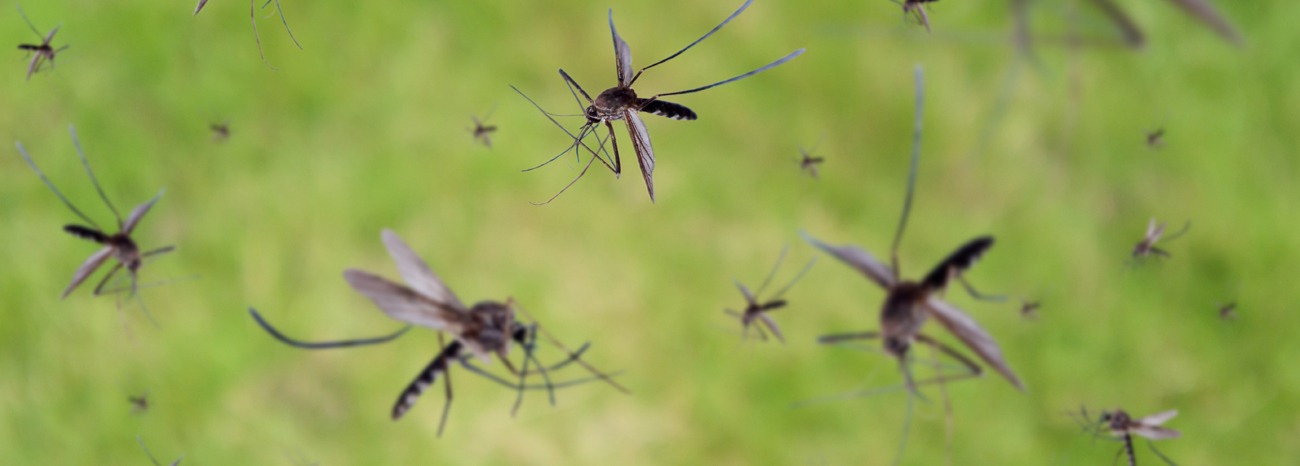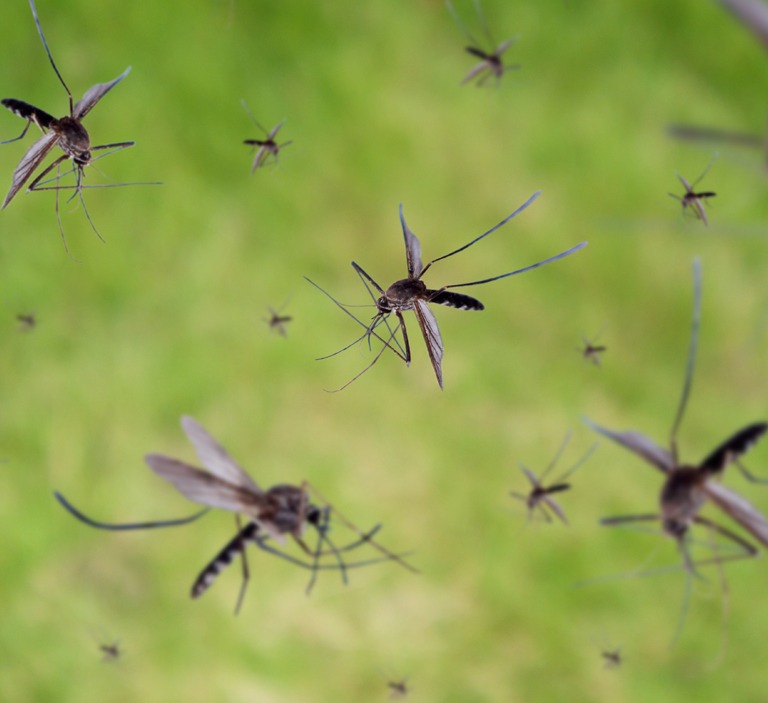Mosquitos are tiny pests that deliver a significant threat. Not just the welts left by their bites, which are annoying and uncomfortable. Mosquitos pose a public health threat due to their ability to transmit diseases.
Here at Moyer, we work every day to protect our customers from the serious implications of the diseases mosquitos can carry and transmit.
The Role of Mosquitos in Disease Transmission
Mosquitos become carriers of diseases when they bite infected hosts – typically birds or mammals – and later bite humans, potentially passing the pathogen on in the process. The types of diseases carried by the different mosquito species varies, making it essential to control all mosquito types to prevent the spread of a wide array of illnesses.
Common Mosquito-Borne Diseases
While there are many mosquito-borne diseases, here are the most common.
Malaria: This life-threatening disease is caused by a parasite that is transmitted to humans through the bite of female Anopheles mosquitos. Symptoms include fever, headache, chills, and vomiting. If not treated within 24 hours, malaria can lead to severe illness or death. While this type of mosquito is present in the United States, malaria is primarily found in tropical and subtropical climates, including parts of Sub-Saharan Africa and South Asia.
Dengue Fever: Dengue is a viral infection spread by the Aedes mosquito and can lead to a serious flu-like illness. Symptoms include severe muscle pain and high fever. Dengue is widespread in many parts of the world, especially in tropical climates, with approximately half of the world’s population at risk. In the United States, outbreaks have occurred in Texas, Hawaii, Florida and the outlying territories.
Zika Virus: Also spread by the Aedes mosquito, the Zika virus can cause symptoms like mild fever, skin rash, and conjunctivitis. Even more concerning is the fact that infected people may exhibit no symptoms at all. Of particular concern is the disease’s link to birth defects when pregnant women get infected. If you experience any of these symptoms following a mosquito bite, it’s best to seek medical attention. Thankfully, the United States has not seen an outbreak of the Zika virus since 2017.
West Nile Virus: Primarily transmitted by the mosquitos that bite infected birds, most people infected with West Nile virus do not experience symptoms. Regardless, in a small percentage of cases this virus can lead to severe neurological illnesses like encephalitis or meningitis. West Nile virus has been reported in all of the continental United States, so if you have a mosquito bite and also experience these symptoms, please seek medical attention:
- Sudden high fever
- Severe headache
- Nausea and vomiting
- Sore throat
- Joint pain, backache, and/or muscle aches and weakness
Yellow Fever: This acute viral disease is transmitted by the Aedes and Haemagogus mosquito species. While mild cases cause fever, nausea, and aches, severe cases can cause life-threatening heart, liver, and kidney conditions. Yellow fever is endemic in parts of Africa and Central and South America.
Chikungunya: Transmitted through the bite of infected Aedes mosquitos, symptoms include joint pain, fever, and rash. There is no cure for the disease. Treatment is focused only on relieving the symptoms. Chikungunya occurs in Africa, Asia, and India, but in recent years it has been reported in Europe and the Americas.
Impact of Mosquito-Borne Diseases Globally and Locally
The global impact of mosquito-borne diseases is substantial. Affecting millions of people each year, their effects represent a significant public health burden. While this is especially true in tropical regions with high mosquito populations, the ramifications of diseases transmitted by mosquitos are far-reaching.
The type and extent of mosquito-borne diseases can vary significantly depending on climate, mosquito species present, and local health infrastructure. Here in the United States, there are over 200 types of mosquitos. Of those, only 12 species have the potential to spread disease. Thankfully we have the health care infrastructure and mosquito control methods needed to provide protection and care from these diseases.
Prevention and Control of Mosquito-Borne Diseases
Avoid areas with high mosquito activity – in the woods, near wetlands and anywhere with standing water – particularly at dawn and dusk when many mosquito species are most active. Taking personal preventive measures like using insect repellents and wearing protective clothing will help, too.
Take control of your backyard and outdoor spaces to avoid mosquitos. Eliminate any unnecessary areas where standing water can collect, creating prime breeding ground for mosquitos. Make sure your window screens are in good shape and even consider using mosquito nets.
Role of Professional Mosquito Control in Disease Prevention
The best way to avoid mosquito-borne illness? Avoid getting a mosquito bite. We know that isn’t a 100% fool-proof plan, but accessing professional mosquito control will play a vital role in protecting you from mosquito-borne diseases.
Our Moyer Mosquito program includes a resistant-proof treatment designed to significantly reduce mosquito populations in your surroundings, reducing the risk of exposure to mosquitos and the diseases they carry.
Moyer Mosquito targets all stages of the mosquito life cycle from larvae to adults. We start with a thorough inspection to identify breeding sites, followed by treatment to reduce mosquito populations and regular follow-up to ensure ongoing control.
We work with you to create an integrated pest management strategy that offers long-term protection and peace of mind.
To learn more, call 215.309.8598.

